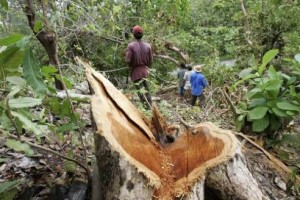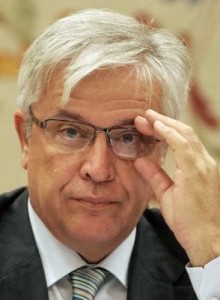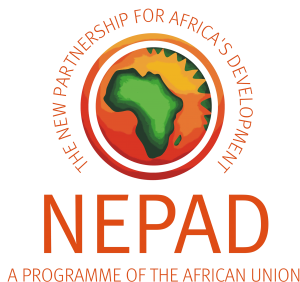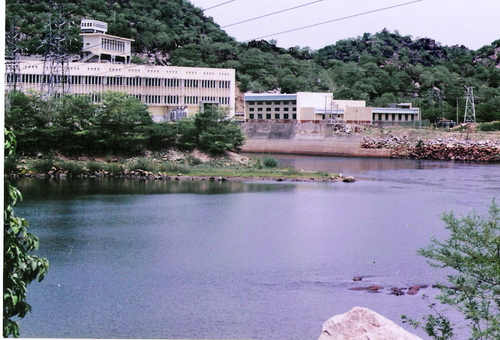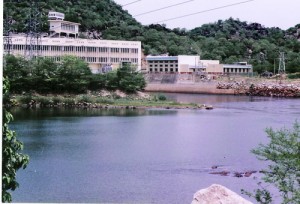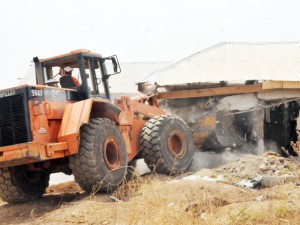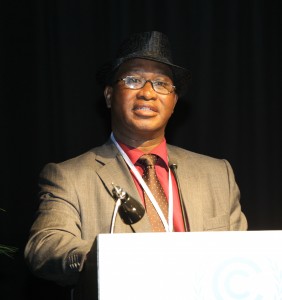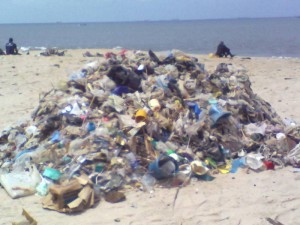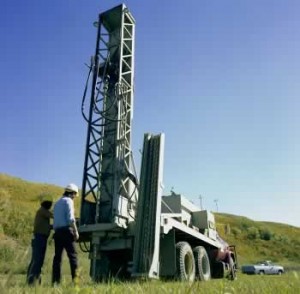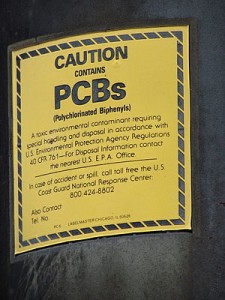Parties were divided on the way forward to advance further work under the Ad Hoc Working Group on the Durban Platform for Enhanced Action (ADP) under the UN Frameowrk Convention on Climate Change, which is tasked to develop a new agreement under the Convention which is applicable to all Parties and is to come into effect from 2020.
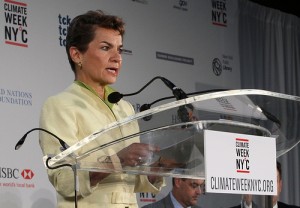
While some countries including the European Union, Least Developed Countries (LDCs), the Alliance of Small Island States (AOSIS) and the African Group wanted contact groups to be organised in Doha for the ADP at the forthcoming 18th meeting of the Conference of Parties (COP 18) to the Convention, a large number of other developing countries wanted discussions in roundtables to continue (as was conducted in Bangkok) under the ADP to be the way forward for further exploratory work to enhance further understanding among Parties.
While some countries including the Umbrella Group (non-European developed countries), the European Union and the LDCs supported a proposal by AOSIS for a ministerial level roundtable in Doha, 24 developing countries led by Malaysia said that such a ministerial was premature and could only be organized under the directions of the COP.
The G77 and China stressed that successfully completing the work of the other two Ad Hoc Working Groups under the Bali Action Plan for Long-term Cooperative Action (AWG-LCA) and the Kyoto Protocol (AWG-KP) is necessary for the ADP process.
Two roundtables on the theme of ‘vision’ (for the new agreement) and ‘ambition’ (on how to increase the mitigation ambition) were held from 30 August to 4 September and an informal plenary of the ADP was convened on 5 September to conclude its work in Bangkok. The Co-chairs of the ADP are Mr. J.M.Mauskar (India) and Mr. H. Dovland (Norway).
Mauskar at the closing plenary informed Parties that after the session, the Co-chairs will prepare, under their own responsibility, two summaries to reflect the discussions at the roundtables.
Parties were informed that these summaries have no formal status in the negotiations and are made available to assist in their preparations. The Co-chairs will also prepare, under their own responsibility, a note that will contain their reflections on the session as a whole and look forward to Doha and beyond. This note also has no formal status in the negotiations and is made available to Parties to assist in their preparations.
Mauskar said that the outcomes of the AWG-LCA and AWG-KP will be central pieces for Doha but the ADP will also have its own importance. He also said that workstream 1 (dealing with the post 2020 agreement) and workstream 2 (on the pre 2020 mitigation ambition) will have different characteristics and Parties were in a “conceptual exploratory stage”. There will be a formal session of the ADP in Doha (the Bangkok session was an informal additional session) and some kind of outcome may be needed to indicate that the ADP was doing well, he added further.
Algeria for the G77 and China said that the ADP process is critical to take the Convention forward. There is need to ensure strong linkage between mitigation, adaptation and means of implementation manner. It emphasised the need to successfully complete the work of the LCA and KP and to provide the necessary solid basis for the ADP process. It said that the ADP should not rewrite the Convention and must respect the objectives, principles and provisions of the Convention, especially the principles of equity, CBDR (common but differentiated responsibilities) and respective capabilities. Negotiations should be party- driven, open and transparent. It said that under workstream 1, there should be a further brainstorm to clarify conceptual ideas. It also wanted discussion on the means of implementation.
Malaysia speaking for Algeria, Argentina, Bolivia, China, Cuba, Democratic Republic of the Congo, Ecuador, Egypt, El Salvador, India, Iran, Iraq, Kuwait, Malaysia, Mali, Nicaragua, Pakistan, Philippines, Saudi Arabia, Sri Lanka, Sudan, Thailand, and Venezuela said that Parties have made some progress in expressing and understanding each other’s perspectives in relation to the work of the ADP. At Doha, there would be merit in continuing our discussions under the same format, so that Parties could strive to arrive at a much fuller understanding of each other’s positions and objectives.
Given the early and exploratory stage of discussions under ADP, Malaysia said it may be somewhat premature to launch contact groups immediately in Doha and discussions should continue in an exploratory fashion under a Group of the Whole. It said that the idea of a Ministerial on ADP discussions is also likewise somewhat premature. In any case, a Ministerial can only be organized under the directions of the COP and as such, must have a larger focus, not limited to ADP, with key attention on the second commitment period of the KP, the most urgent task for us this year.
Malaysia said that work under the DP reflects an opportunity to enhance implementation of the Convention. It was looking for ambition and equity on all elements of the DP, particularly from developed countries that are committed to take the lead in reducing their emissions and in providing support and the means of implementation so that developing countries can contribute equitably in a manner that also promotes their sustainable development.
It reiterated its fundamental belief that the work of the ADP, under both its workstreams is ‘under the Convention’ which means that all the principles and provisions of the Convention shall apply to the work of the ADP and remain paramount in considering all or any other elements that relevant parties attach importance to. This is necessary to fulfil the ultimate objective of the Convention. The responsibilities and obligations of all countries in any period must be built on the principles of equity and CBDR.
Malaysia said it was useful to hear this understanding shared by a large number of Parties in the roundtables. It is necessary to reflect a similar shared understanding in planning the work of the ADP. It said work of the DP is at a very initial stage and Parties should continue to identify the various elements necessary to define the scope of our work in Doha.
It said further that Doha should focus on delivering agreed outcomes in the AWG-KP and AWG-LCA. A firm foundation for the work in the ADP would be laid at Doha through the successful conclusion of the KP negotiations marked by having ambitious targets from Annex I KP Parties to be provisionally applied as of 1 January 2013; and ambitious and equitable results on all elements of the BAP. These positive outcomes in KP and LCA would have a positive effect on the ADP’s work. DP (the Durban Platform) is only one part of the package of Durban that includes results in KP and LCA, said Malaysia.
After Doha, it said the focus should be on identifying the issues relevant to the work and preparing for the meeting of the subsidiary bodies at Bonn. This may be supported if necessary through in session workshops at Bonn as may be necessary and agreed by the Parties, it added further.
Swaziland on behalf of the African Group expressed concerns about lack of engagement by developed countries on critical aspects necessary for concluding our work under the Bali Road Map, particularly on support for finance, technology, adaptation support by developed countries, including mitigation commitments of developed countries not Party to the 2nd commitment period of the Kyoto Protocol. This has the potential of contaminating the good spirit cultivated in this session.
It reaffirmed that workstream 1 of the ADP negotiations should culminate in an enhanced multilateral rules-based regime that ensures the full, effective and sustained implementation of the Convention. The outcome is to be under the Convention, and must express principles and provisions of the Convention, including historical responsibility, CBDR as well as the overriding developmental priorities of developing countries. It further reaffirmed that the principles of the Convention equally apply to workstream 2, and emphasised that the work on ambition is for additional actions over and above the commitments inscribed under the Bali Roadmap going to 2020. It is however important that such actions are recognized under the Convention; as such clear accounting is necessary in order to understand their contribution to the reduction of the gap.
Swaziland said the ambition workplan is not a substitute for commitments under the Bali Roadmap. It welcomed proposals by Parties shared in the ambition roundtable for the submission of proposed initiatives with an articulation of expected reductions, quantum of finance necessary, and the source of such financing, and the proposed delivery mechanisms, noting the proposal by the Africa Group for use of institutions established in Cancun and Durban. Demonstrating of the commitment to the reassurances made in Durban to the Durban Package is essential. It looked forward to the stepping up of work in Doha, and establishing a contact group to prepare decisions on how we plan our work for 2013 on both workstreams.
The Bali Roadmap comprises the Bali Action Plan adopted by the UNFCCC COP in 2007 and the second commitment period of emissions reduction by developed countries under the Kyoto Protocol.
Egypt on behalf of the Arab Group said the outcome of the ADP should strengthen the existing multilateral regime for climate change. It should be firmly grounded in the principles and provisions of the Convention. It should, like the Convention under which it is negotiated, be applicable to all while respecting the principles of equity and CBDR and addressing all building blocks in a balanced manner, as agreed in Durban. Parties are not starting from a vacuum, it said.
Many efforts were exerted during the last few years under both the AWG-KP and AWG-LCA. Hence, the work of the ADP has to as its point of departure, the results of the work accomplished in these two working groups. These long-standing mandates must be delivered as a basis for determining the basis of work of the ADP.
Egypt said the Bangkok meeting has given a positive signal that the ADP has successfully been launched. It believed that it would be most useful if the co-chairs could prepare a matrix incorporating the various elements of the Durban decision and present for consideration of Parties their proposals on how these could be implemented as of the beginning of 2013. It also proposed two roundtables to be held in Doha touching upon the issues of means of implementation and of equity, and for this working group to be briefed of the conclusions of the workshop on long term finance, as these would complement the discussions that took place in Bangkok, and provide an important input for our work in this working group.
It said that there is no contradiction between equity and ambition, and that equity in fact can and must be the gateway to an ambitious outcome under this working group. In fact, ambition should apply across the board and not be of a selective nature. It also believed that all countries have the inalienable right to develop as well as the right to survival.
It also stressed that the success of efforts under the ADP will depend on the successful conclusion of the AWG-KP and AWG-LCA by Doha, and above all on the faithful implementation of the Durban package. It was still hopeful that by Doha, and with much stronger determination, Parties will achieve a quality legal second commitment period, comparable efforts by annex 1 non-KP parties under the LCA, as well as the much needed progress in adaptation, finance, technology and capacity building.
Cuba on behalf of the ALBA group of countries expressed its great concern on the impending gap between the first and second commitment period of the KP (the first commitment period ends on 31 December 2012). Despite announcements made 8 month ago, we still don’t have numbers (on emissions reduction) on the table. On the other hand some Parties have not been willing to engage in work to bring to an agreed outcome the AWG-LCA and thus fulfil this second track of the Bali Road Map. Just like this Ad Hoc Working Group (ADP), the AWG-LCA was created as a space for exchanging ideas with a view to improve the climate change regime in the light of the principles and provisions of the Convention and its outcomes are of direct relevance to the ADP process.
It highlighted the need to safeguard the only rules-based multilateral system that exists. No society would tolerate that initiating discussions on a “new law” implies that you are not required to comply with the existing law. No one is above the ecological carrying capacity of our planet, which is the ultimate law… From now till 2020, it would seem that some Parties interpret this juncture as an opportunity to shirk responsibilities, said Cuba.
The implementation of this “non-system” from now till 2020, comprised of loose promises, lacking rules and lacking clear targets, paradoxically occurs at a time when the effects of climate change demand more commitment, not less, and when equity, clear rules and solidarity are most needed. Its expectation from these roundtable discussions is to deepen understanding of root causes and barriers for addressing them. Key to this effort is the discussion on sustainable patterns of consumption and production and equity, said Cuba.
It further said that developing countries are showing much more ambition than developed countries on a voluntary basis. Nevertheless, this situation does nothing to address the inherent gaps in equities in the climate change conundrum, in acting in accordance with our CBDR and respective capabilities. If a system is going to replace KP, it cannot be weaker than the existing one. Flexibility in taking actions to reach common goals, national circumstances and the applicability to all countries are all issues on which we are confident we could reach agreements on. The principles and provisions of the Convention have ample provisions to accommodate such considerations. What we cannot allow is to use these arguments as an excuse to reinterpret and in this way eliminate, the principle of CBDR between developed and developing countries. This is unacceptable. The Convention applies to all Parties … but historic responsibilities and use of our common atmospheric space (the carbon budget) cannot be side-lined.
Cuba said that the fate of Doha depends on the fate of the second commitment period of the KP; it is a legal instrument and to comply with it is an obligation. The Parties that refuse to do so cannot expect to “have their cake and eat it”. It would not be fair to other countries that are making efforts to comply with commitments within the multilateral framework.
Nauru for the Alliance of Small Island States said the work of the ADP remains critical for the Doha package. Work on mitigation ambition is of fundamental importance. The Doha outcome should raise the pledges for emissions reductions; remove conditions for these pledges of developed countries and in tightening the rules. It stressed the importance of the means of implementation for developing countries to enhance their ambition. It further emphasised the importance of successfully completing the work of the AWG-KP and AWG-LCA to advance the work of the ADP. It stressed that the ADP is under the Convention. Parties could not pick and choose which principles their liked. On the way forward, it proposed a contact group to be established. It also proposed the need to have high-level engagement of Ministers in relation to the work in workstream 2.
Gambia for the LDCs also stressed the importance of a balanced package in Doha and the successful outcomes under the AWG-KP and the AWG-LCA. It proposed the establishment of 2 contact groups in Doha for both workstreams of the ADP. It also supported the idea of a Ministerial level discussion.
South Africa speaking for the BASIC (Brazil, South Africa, India and China) said the successful completion of the work of the AWG-KP and AWG-LCA was key to advance the work of the ADP which was part of the “mutual reassurances” agreed to in the DP. It proposed further roundtables in Doha to help exploratory work in an open and flexible setting to enhance mutual understanding and build trust. On the call for Ministerial engagement, it said that further discussions needed to be crystallised under the ADP before this was done.
Nicaragua speaking on behalf of the countries that comprise the Central American Integration System (SICA) expressed deep concern for the slow progress this week in this Bangkok session. Again, it is urgent to achieve a greater commitment from all Parties so we can move into concrete actions based under the principles and objectives of the Convention. We must advance in a balance and equitable manner in all the tracks (the AWG-LCA, AWG-KP and ADP) in order to build the climate of confidence to move the whole process forward.
Despite being economies highly dependent on their natural resources and having no legally binding obligations, Nicaragua said the SICA countries are continuing to make meaningful mitigation actions voluntarily, using our own and scarce resources, which are urgently needed in our struggle for poverty eradication and sustainable development. It stressed the need to ensure implementation of the mechanisms on financing, capacity building and technology transfer in order to reinforce the support of our national programs to combat climate change.
The result of the work of the ADP is vital for the future of the Convention, to ensure an effective, equitable, and fair outcome in accordance with the principle equity and CBDR in the implementation of the work and reach a legally binding agreement that includes all the pillars seen in the Bali Roadmap and that does not jeopardize or undermine the second commitment period of the KP.
Peru speaking for itself, Chile and Colombia said that the future legally binding regime should set incentives for high ambition and rewards for those who do so. It wanted a common understanding for equity, fairness, and a “dynamic approach to differentiation” (as advanced by developed countries).
Australia in the Umbrella Group said that the DP called for the widest global response to climate change. There is need to ensure countries were not “holding hostage” its work for effective climate outcomes. It welcomed opportunity for ministerial engagement in the roundtables at COP 18 on a number of key questions. On the new agreement, it suggested discussion on how to design an agreement applicable to all that takes into account countries’ national circumstances; builds ambition over time and has widespread global participation; has lessons from the UNFCCC; addresses domestic drivers, constraints and potentials; how the new agreement is relevant to enhance adaptation; and how to build agreement under the Convention but adapted to the world after 2020. On the raising of ambition under workstream 1, Australia said that this could be done through voluntary initiatives; actions by those countries who have yet to forward their pledges and other complementary initiatives such as in cities and the private sector. It said that the ADP was a core part of the Durban deal.
The European Union said that for a successful outcome in Doha, all work must be taken forward as agreed to in the Durban compromise. It wanted tangible progress under the ADP with concrete activities to raise ambition as well as planning work for a legally binding agreement post 2020. For the post 2020 agreement, it said the Convention principles will apply but said there is need to work together to define how these principles would be applied in post 2020 in a way that all Parties participate in a collective way with fair and sufficient ambition and support given to those who need it. In the pre 2020 workstream, it suggested exploration of possibilities on how to enhance collective efforts before the new agreement in 2020. It wanted clarification of what the next steps will be with clear milestones. It supported the proposal for a ministerial level roundtable to discuss preparations for the 2020 mitigation agreement. It proposed the setting up of two contact groups for both the workstreams whose deliverables are different.
Switzerland for the Environmental Integrity Group said there is need to capture existing common ground from the roundtable discussions on the post 2020 regime and its characteristics. It said that real progress in the ADP is an essential part for the balanced package in Doha. In relation to workstream 2 on ambition, it wanted exploration of options under and outside the Convention.

